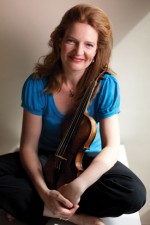Title
Many so-called historically informed performers discern an affinity with early music after a thorough training in the modern classical tradition. But Baroque violinist Rachel Podger, who will make her Juilliard debut this spring with two Juilliard415 concert cycles, was born and raised on music written before 1800. On March 19, she'll lead the ensemble in single and multiple violin concertos by Antonio Vivaldi, and in June, in New York, Boston, and Europe, she will assume the role of concertmaster and lead Juilliard415 along with members of London's Royal Academy of Music in concerts of music by J. S. Bach under the direction of Masaaki Suzuki. You can read the program note from the June concerts here.
Body
Renaissance and Baroque music permeated the Podger household. Julian, her brother, is an acclaimed singer and director, and both parents performed with John Eliot Gardiner and the Monteverdi Choir when it was in its infancy. "We played chamber music quite a bit at home. Mum played cello and Julian and me violin and my dad [a chorister and choral scholar at King's College, Cambridge University] all sorts of things," Podger said in a recent phone interview with The Journal. "I remember learning to count in a Bach trio sonata, how many beats there are in a bar. I got so lost! I breathed Baroque music really before I knew anything at all about the style."
She recalled a performance of Bach's Christmas Oratorio when she was quite young: "Luckily the fiddle players were staying with us, so I asked lots of questions and one of them gave me a lesson" on the Baroque violin, she said. "The purity of the sound, the depth, the gutsy connection and the clarity was astounding."
That's not to say that Podger's education was always so easygoing. While she was studying modern violin at the Guildhall School of Music and Drama in London, she asked her teacher whether she could have secondary lessons on a Baroque instrument. "It wasn't really the thing to do in your first year. You were supposed to establish your technique," she recalled. As it happened, the school's sole Baroque instrument had been given to another student, but Podger was undeterred. "I got hold of an instrument and did it anyway."
The March program, at Madison Avenue Presbyterian Church, will feature concertos by Vivaldi from his monumental L'Estro armonico, Op. 3, and La Stravaganvza, Op. 4, collections. Although Vivaldi is chiefly remembered for his instrumental concertos—The Four Seasons being the most celebrated—he also composed many oratorios, operas, and cantatas. For 30 years he was maestro di violino and later maestro de' concerti at Venice's Ospedale della Pietà, a charitable institution for orphans and abandoned girls. This ospedale and others like it were known for their excellent music training and their performances were justly famous. The Opus 3 and 4 concerto collections were composed for and performed there, with Vivaldi taking the lead, which Podger will do in the March performance.
"Vivaldi's music is extremely vibrant. There's a huge amount of variety in his writing, especially in Opus 3, where he's experimenting with different models and structures and instrumentations," Podger said. "You need to know what you are looking for, like a minimalist, and suddenly it all jumps out at you," she added.
The second Juilliard concert cycle involving Podger will be Juilliard415 performances—in Boston, New York, Leipzig, and London—of three Bach cantatas as well as his famous Concerto for Two Violins in D Minor, BWV 1043. Unlike the Vivaldi project, for this series, Podger will act as concertmaster, under legendary Baroque music interpreter Masaaki Suzuki.
Switching from performing to conducting and back, which she does frequently, was hard to adjust to at first, Podger admitted, noting "they're definitely different hats." Still, she added, "it's really healthy not to do just solo performance. That's not an 18th-century idea—even if you were a brilliant soloist you did it all, singing, composing, playing, etc. They all contribute to each other. So I don't shy away from that."
Podger's schedule these days is desperately packed, as one would expect of an artist of her caliber and popularity, with solo performances, recordings, and international tours in addition to her work as the artistic director of the British-based Brecon Baroque ensemble. She also spends as much time as she can with her family, which includes two daughters, who are 11 and 14. "They're great company," Podger said. "It's a kind of strange life as a traveling musician. It's almost incompatible with being a home person, although I love both!"
She pauses before dashing off to her next engagement to give a bit of advice to young performers. "If you're not in it, then you can't expect the audience to be in it for you. If you're standing up and playing or directing, they won't believe you if you don't believe in yourself completely. Just believe in yourself utterly."





